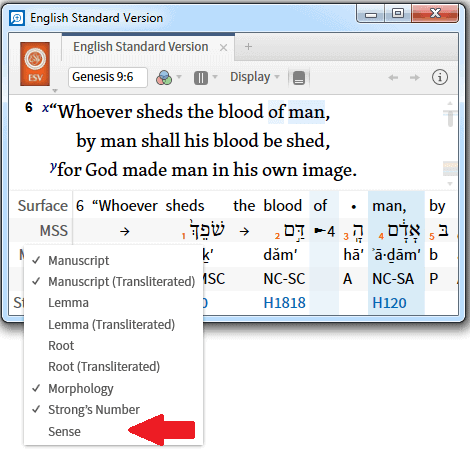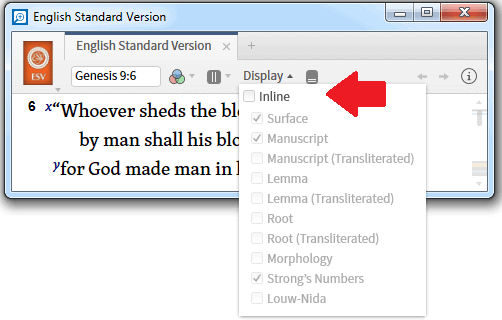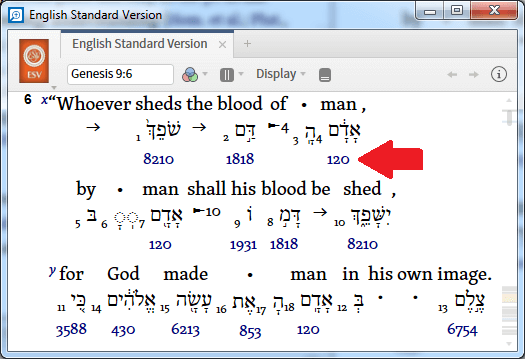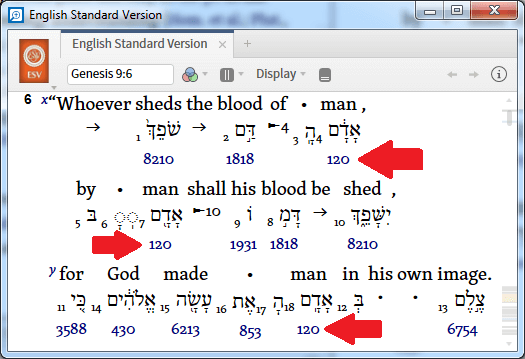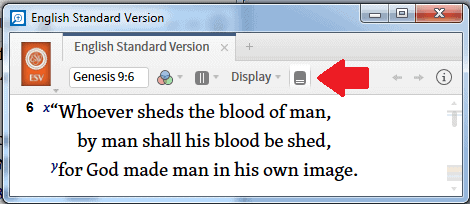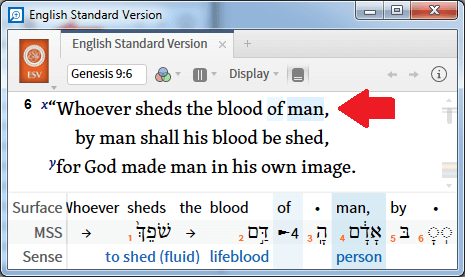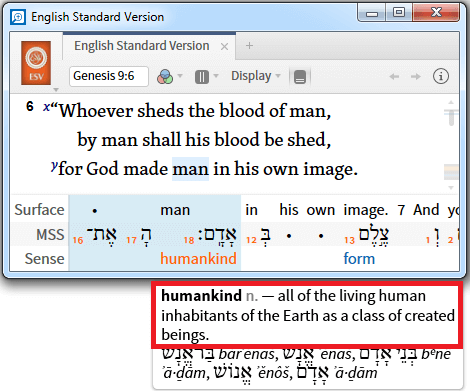The Bible Sense Lexicon is a revolutionary tool for understanding biblical words and their meanings. This tool brings together three critical aspects of biblical word study: contexts, words, and meanings.
These relationships can be quite complex. The traditional approach to word study is to start by looking up the Greek or Hebrew word in a dictionary. But dictionaries often don’t reference specific verses, and they offer so many different meanings—how do you know which is right in context?
For example, if we open the ESV to Genesis 9:6 and turn on the inline display, we can see the Strong’s numbers associated with the Hebrew words:
And if, for example, we click on Strong’s number 120, we’re taken to the following entry in the Enhanced Strong’s Lexicon:
Strong’s provides several English words as possible equivalents for this Hebrew word.
- What are the appropriate Strong’s words to insert?
- Are they all the same?
With the Bible Sense Lexicon, we’ve analyzed the triangle of context, word, and meaning for all of the Bible’s nouns and verbs ((Note: verb senses will be available in Logos version 5.1b, which should be released later this month.)) in the original texts (adjectives and adverbs should be included in Logos 5.2). Because of this, you can now find an appropriate meaning for a word in any context.
If we turn off the inline display and instead turn on the interlinear ribbon, you can see just how powerful this dataset really is:
- Click the Interlinear button next to the Display dropdown.
- Right-click the left-hand panel-row labels and enable Sense (and disable any rows you don’t want to see).
- Now click the word you want to know more about.
The word you care about is highlighted in the sense line.
- Hover over the sense label “person” to see its definition.
- But now, click the last “man” in the passage, and hover over its sense label, “humankind”:
The context is the same and the word is the same, but the meaning has changed! The first two times, the Hebrew word rendered “man” in our translation is used to refer to an individual person, but the third time, it’s used to refer to humankind as a whole. The Bible Sense Lexicon cuts through the complicated matrix of context, words, and meanings to give you exactly the information you need—quickly.
Here are some ways you can use this powerful tool:
1. For a devotional on almost any topic. Want to develop a short lesson about wisdom? Search the Bible Sense Lexicon for “wisdom” and find multiple kinds of wisdom, all with links to specific passages and distinct definitions.
2. For a Bible study on a specific passage. The Exegetical Guide uses the Bible Sense Lexicon to show you the specific meaning of each noun or verb in a passage. By comparing how the author uses different senses or the same sense of different words, you can better grasp the author’s flow of thought for your study.
3. For a sermon on any passage or topic. A huge benefit of the Bible Sense Lexicon is that it gets you the information you need quickly. Use it to understand the key terms in your passage for Sunday, or develop a topical sermon based on concepts you can easily find with the BSL. Add depth and meaning to your message, save time by harnessing the lexicon’s integrated power, and get on with crafting a compelling message.
Connect to the meaning of God’s Word: start studying with the Bible Sense Lexicon, available in Logos 5 Gold or higher. For a little while longer, you can save big on a base package upgrade—upgrade today!

